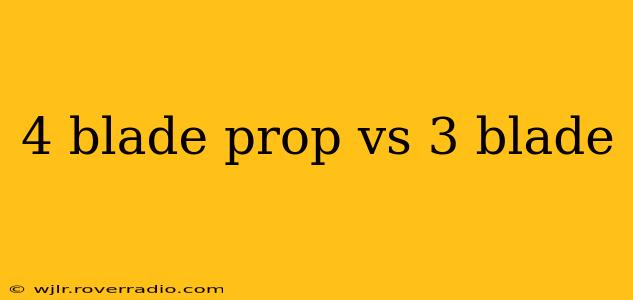Choosing the right propeller for your boat can significantly impact its performance, fuel efficiency, and overall handling. Two of the most common choices are 3-blade and 4-blade propellers. While both effectively propel your vessel, they offer distinct advantages and disadvantages. This comprehensive guide will help you understand the key differences between 4-blade and 3-blade props to make an informed decision.
What are the Main Differences Between 3 and 4 Blade Props?
The most obvious difference lies in the number of blades. This seemingly small variation leads to significant changes in how the propeller interacts with the water, influencing several key performance aspects. A 4-blade prop generally produces more thrust at lower RPMs than a 3-blade prop, but this comes at the cost of increased drag and potentially lower top speed. A 3-blade prop, on the other hand, typically offers higher top speeds and better fuel efficiency at higher RPMs, albeit with slightly less low-end thrust.
Which Propeller Provides More Thrust?
Generally, a 4-blade propeller provides more thrust, particularly at lower RPMs. This increased thrust is due to the greater surface area interacting with the water. This makes 4-blade props ideal for boats that need strong acceleration, like those towing water skiers or carrying heavy loads. However, it's crucial to remember that “more thrust” doesn’t automatically equate to “better.” The optimal choice depends on your boat's specific needs and usage.
Which Propeller is Better for Fuel Efficiency?
This is a more complex question with no definitive answer. While 3-blade props generally offer better fuel efficiency at cruising speeds, the actual fuel consumption depends heavily on factors like boat design, engine type, and operating conditions. A poorly matched 3-blade prop can be less efficient than a well-matched 4-blade prop. The increased drag of a 4-blade prop can negate any potential fuel savings, particularly at higher speeds. Ultimately, the best way to determine fuel efficiency is through real-world testing with different propellers.
Which Prop is Better for Top Speed?
3-blade propellers typically offer a higher top speed. Because they have less surface area in contact with the water, they experience less drag at high RPMs, allowing the boat to reach greater speeds. However, this advantage is only realized if the prop is correctly sized and pitched for your boat and engine. An improperly sized 3-blade prop might actually result in lower top speed compared to a correctly sized 4-blade prop.
What About Hole Shot?
Hole shot (initial acceleration from a standstill) is generally better with a 4-blade propeller. The increased surface area allows for quicker acceleration out of the hole. This is particularly beneficial for boats that frequently need quick starts, such as those used for watersports or in situations requiring rapid maneuvering.
Which is Better for a Specific Boat Type?
The optimal propeller choice varies significantly depending on the boat type. For instance, heavier displacement hulls often benefit from the increased thrust of a 4-blade prop, while lighter, planing hulls might prefer the higher top speed potential of a 3-blade prop. Consult your boat's owner's manual or a marine propeller expert for recommendations tailored to your specific vessel.
How Do I Choose the Right Propeller?
Selecting the correct propeller involves considering several factors beyond the number of blades. These include:
- Boat type and size: Displacement hull, planing hull, etc.
- Engine type and horsepower: The engine's specifications are crucial for propeller selection.
- Desired performance characteristics: Prioritize thrust, top speed, or fuel efficiency.
- Operating conditions: Water depth, currents, and typical load.
It's highly recommended to consult with a marine propeller expert or a qualified mechanic to determine the best propeller for your specific boat and its intended use. They can analyze your boat's characteristics and help you select the optimal propeller for optimal performance and efficiency.
This information provides a general overview; individual results may vary. Always consult with a professional for personalized advice.
